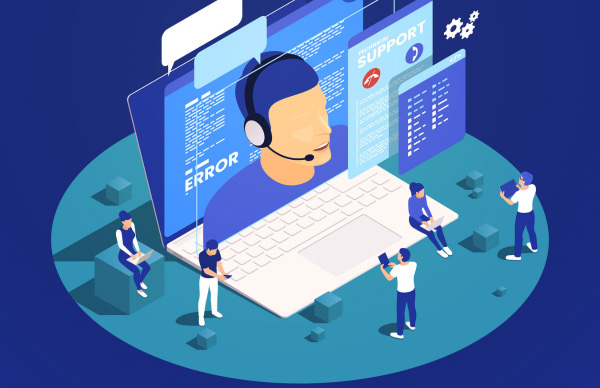The beginner's guide to hiring IT support for your business
When running a business, it is essential to have reliable IT support. A good IT provider can help keep your company’s systems and data secure, while also providing expert advice on the latest technology trends. In this article, we’ll explore everything you need to know about buying IT support for your business.
What does an IT provider do?
An IT provider will be responsible for maintaining and monitoring all of your business’s networks and systems. This includes troubleshooting any technical issues that may arise and providing support with software and hardware upgrades. Additionally, a good IT provider will also be able to provide recommendations on how to best secure and protect your data, as well as advise you on the best ways to use technology to maximise efficiency.
How do I choose an IT provider?
The most important thing when selecting an IT provider is that they are experienced in dealing with businesses like yours. Ask potential providers about their experience working with companies in the same industry as yours, as well as any certifications or qualifications that they hold. It’s also important to ask about their response times and customer service policies so that you know what kind of service you should expect from them. Finally, make sure that the pricing structure works for your budget before signing a contract with them.
What else should I consider?
When deciding on an IT provider, consider the types of services they offer. Will they provide remote support, or do they require visits to the premises? If so, how often do these visits occur? Also, consider whether they offer fixed-price plans or if they charge by the hour – this can make a big difference in terms of cost-effectiveness. Additionally, check if they have any additional services such as managed hosting or cloud storage solutions – these can save you time and money down the line.
Choosing an IT provider for your business can be a daunting task – there are many factors to consider before making a decision. However, if done correctly, it can pay dividends in terms of increased efficiency and better protection for your data. By researching potential providers thoroughly – including their experience working with similar businesses, response times and customer service policies – you should be able to find the right one for you at a price point that suits your budget. With adequate research and due diligence on your part, finding quality IT support won't be difficult!
Many businesses fail to take into account the unique needs of their business, and as a result, end up hiring an IT service provider who is unable to meet those particular needs. Here is the list of common mistakes businesses make:
Not homing in on the specific requirements of the business: It is essential to have a clear list of objectives and expectations when hiring IT support, as this ensures that you can narrow down your search to providers who can fulfil your needs.
Failing to assess the applicant's technical ability: Technical proficiency is key in any IT support role, so it is important that potential hires are put through an extensive assessment process to ensure they have the right skill set.
Neglecting to consider the cost: The price tag shouldn't be the only factor when making your decision, but it certainly should be taken into account - after all, there's no point hiring someone if their services are too expensive for your budget.
Not having a clear idea of what is required from the start: Before going ahead with any hire, it is essential that you have a clear picture of what will be expected from them - this includes duties, working hours and other conditions
Skimping on references and background checks: It's vital that you obtain references and carry out comprehensive background checks in order to get a better understanding of any prospective candidate's qualifications and experience
Not considering how well an individual would fit into your existing team dynamic: It isn't just about meeting technical requirements; you also need to make sure that any new hires will gel well with current staff members and work together harmoniously.
Ignoring employee feedback and reviews: Employee feedback can provide valuable insights into how well an individual works within the company environment, so don't forget to take into account employee opinions before making a final decision.
You can't run your business successfully without IT support. There is no doubt about that. To help you with your IT needs, our support team here at UK IT Service - IT Support London is there 24/7.
We aim to not only deliver top-notch IT support in London but also to provide you with all the information you need to know about our services before you get started.
Also, don't forget to follow us on Facebook and Twitter or share or like our blogs. We regularly post new content!
You can find all the information you need about IT support here!
What does an IT support company do?
An IT support company is a business that provides assistance and solutions for businesses or individuals in the areas of information technology (IT) including software, hardware and networking.
Depending on the size of the IT service provider, different services may be offered such as installation, maintenance and troubleshooting of computer systems, networks and databases; administration of server operating systems; desktop support; data storage backup and recovery; e-mail services; security system setup (firewall protection); website development/hosting services; end-user training programs; printer setup/maintenance/repair services etc.
What is IT support?
IT support, also known as technical support, refers to a range of services assisting with technology products such as computers, electronic devices, software applications and networks. IT support is generally available from the manufacturer or developer of the particular product and can include on-site services or remote troubleshooting over the phone or the internet.
Generally speaking, IT Support can be broken down into three different components: hardware maintenance/troubleshooting; software installation and troubleshooting; and network setup and maintenance. In addition to these functions, many IT service providers also offer proactive assessments for preventing future problems.
What is an IT service example?
One of the most common examples of an IT service is network management. Network management involves setting up networks for optimal performance, troubleshooting problems as they arise, performing system updates when necessary, monitoring for security threats such as viruses or malware attacks and responding appropriately. Other tasks associated with this type of service include creating user accounts on each machine connected to the network (and assigning roles/permissions accordingly), configuring firewall settings to ensure secure communication between machines on the network, managing user access rights following company policy etc.
Why is IT support needed?
What are the hard skills for IT support?
Hard skills are the technical abilities and knowledge that are required to successfully perform an IT support job. These include things like troubleshooting hardware and software issues, configuring networks, setting up computers and related equipment, researching potential solutions for complex problems, understanding core internet protocols, upgrading systems regularly for security purposes, learning new technologies quickly and effectively, deploying patches on a timely basis to ensure system healthiness and reliability.
Author Bio
Vikki Durden is an experienced IT professional with a deep knowledge of the support services available to businesses. She has over fifteen years of experience in the field, having worked for top-tier firms such as Microsoft and Dell. Vikki is passionate about helping small businesses succeed and leveraging technology to do so. With her expertise and passion, she hopes to guide business owners in making the best decisions when it comes to IT support.



